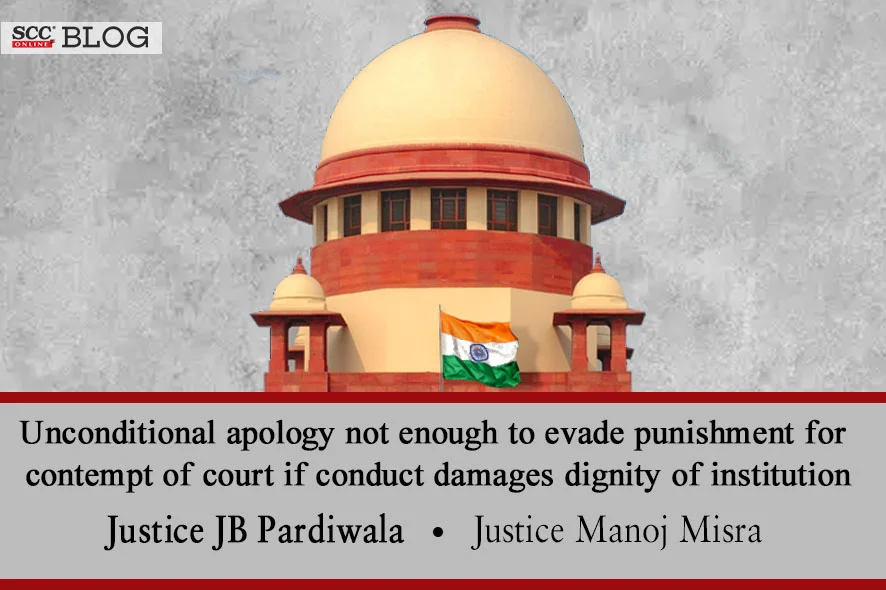Supreme Court: In a case where the Gujarat High Court found the appellants guilty of contempt of court for disobeying an undertaking given to the court regarding the sale of certain properties, and hence, declared the sale transactions to be void, the bench of JB Pardiwala and Manoj Misra, JJ has came down heavily on the litigants using ‘apology’ as a ‘potent weapon’ to avoid punishment and held that courts should not accept an apology if the conduct has seriously damaged the dignity of the institution, even if it is unconditional, unqualified, and bona fide.
“There ought not to be a tendency by courts, to show compassion when disobedience of an undertaking or an order is with impunity and with total consciousness.”
The Court took judicial notice of the fact that over a period of time, the courts have shown undue leniency and magnanimity towards the contemnors. This lenient attitude shown by the courts over a period of time has actually emboldened unscrupulous litigants to disobey or commit breach of the order passed by any court or any undertaking given to the court with impunity.
Using the case at hand as an example, the Court observed,
“What do the appellants want us to do? The appellants want this Court to accept their apology and set aside the order of punishment and sentence passed by the High Court. … We wonder what could be the ultimate outcome if we accept the apology and allow the appellants to go scot-free. First, they would have to face no legal consequences for the alleged act of contempt and secondly, would continue to enjoy or retain the fruits of their contempt. We say so because they have already pocketed a sizeable amount towards the sale consideration obtained from the purchasers.”
Refusing to interfere with the judgment of the High Court, the Court held that in the case at hand, the undertaking was given to the High Court and the breach or disobedience would definitely attract the provisions of the Act 1971.
Stating that apology is not just a word, the Court served a word of caution for the Courts and said that the court should not accept the apology when it appears that saying sorry is nothing but a legal trick to wriggle out of responsibility.
“A true apology must be a deep ethical act of introspection, self-introspection, atonement and self-reform. In its absence, an apology can be termed as farce.”
In the light of the aforesaid observations, the Court concluded that:
-
An assurance in the form of an undertaking given by a counsel / advocate on behalf of his client to the court; the wilful breach or disobedience of the same would amount to “civil contempt” as defined under Section
2(b) of theContempt of Courts Act, 1971 . -
There exists a distinction between an undertaking given to a party to the lis and the undertaking given to a court. The undertaking given to a court attracts the provisions of the
Act 1971 whereas an undertaking given to a party to the lis by way of an agreement of settlement or otherwise would not attract the provisions of the Act 1971. -
Although the transfer of the suit property pendente lite may not be termed as void ab initio yet when the court is looking into such transfers in contempt proceedings the court can definitely declare such transactions to be void in order to maintain the majesty of law. Apart from punishing the contemnor, for his contumacious conduct, the majesty of law may demand that appropriate directions be issued by the court so that any advantage secured as a result of such contumacious conduct is completely nullified. This may include issue of directions either for reversal of the transactions by declaring such transactions to be void or passing appropriate directions to the concerned authorities to ensure that the contumacious conduct on the part of the contemnor does not continue to enure to the advantage of the contemnor or any one claiming under him.
-
The beneficiaries of any contumacious transaction have no right or locus to be heard in the contempt proceedings on the ground that they are bona fide purchasers of the property for value without notice and therefore, are necessary parties. Contempt is between the court and the contemnor and no third party can involve itself into the same.
-
The apology tendered should not be accepted as a matter of course and the court is not bound to accept the same. The apology may be unconditional, unqualified and bona fide, still if the conduct is serious, which has caused damage to the dignity of the institution, the same should not be accepted. There ought not to be a tendency by courts, to show compassion when disobedience of an undertaking or an order is with impunity and with total consciousness.
[Balwantbhai Somabhai Bhandari v. Hiralal Somabhai Contractor, 2023 SCC OnLine SC 1139, decided on 06.09.2023]
Judgment Authored by Justice JB Pardiwala
Know Thy Judge | Supreme Court of India: Justice J.B. Pardiwala
Advocates who appeared in this case :
For Appellant(s): Mr. Mihir Joshi, Sr. Adv. Mr. Shamik Shirishbhai Sanjanwala, AOR Mr. Shantanu Parmar, Adv. Mr. Mukul Rohatgi, Sr. Adv. Mr. Vanshdeep Dalmia, AOR 2 Ms. Natasha Dalmia, Adv. Ms. Devanshi Singh, Adv. Mr. Shivam Pundhir, Adv. Ms. Anisha Jain, Adv. Mr. Soumik Ghosal, AOR
For Respondent(s): Mr. Arijit Prasad, Sr. Adv. Mr. Nachiket A. Dave, Adv. Mr. Pradhuman Gohil, Adv. Mrs. Taruna Singh Gohil, AOR Ms. Ranu Purohit, Adv. Mr. Alapati Sahithya Krishna, Adv. Ms. Nidhi Mittal, Adv. Mr. Rushabh N. Kapadia, Adv. Mr. Vijayanand Tripathi, Adv.






